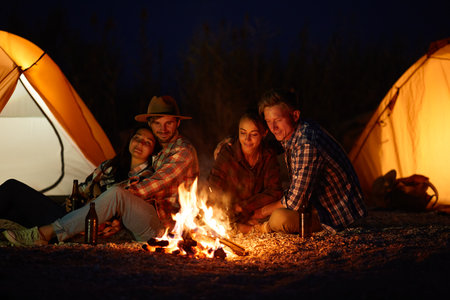Understanding Wild Camping in the UK
In the UK, wild camping refers to pitching a tent or setting up camp outside of designated campsites, often in remote countryside or upland areas. Unlike organised campsites, which provide facilities and require booking, wild camping means you are on your own—no toilets, no showers, and often no marked pitches. Legally, the distinction is crucial: while campsites operate with explicit permissions and regulated amenities, wild camping typically involves occupying private or public land without formal infrastructure. It is essential to understand that, across much of England and Wales, wild camping is technically not permitted without the landowner’s consent. Scotland offers more freedoms under the Land Reform (Scotland) Act 2003, allowing responsible wild camping on most unenclosed land. However, even here, there are codes of conduct and local restrictions to follow. For families considering an outdoor adventure with children or pets, recognising these legal differences sets the groundwork for a safe and respectful wild camping experience.
Legal Framework: Wild Camping with Family, Children, and Pets
Wild camping in the UK is a patchwork of regulations that varies dramatically between England, Scotland, Wales, and Northern Ireland. Before you head out with your children or furry companions, it’s crucial to know the lay of the legal land. Here’s how national and regional laws stack up when it comes to wild camping as a family:
England
In England, wild camping is generally prohibited without explicit landowner permission. This includes public spaces, woodlands, and even remote moors. The law applies regardless of whether you are camping solo or with your family and pets. While some National Parks like Dartmoor previously allowed limited wild camping, recent legal challenges have made this uncertain. For families and pet owners, securing written consent is non-negotiable to avoid potential trespassing charges.
Scotland
Scotland stands apart thanks to the Land Reform (Scotland) Act 2003, which enshrines the right to responsible access for activities such as wild camping—this includes families and pets. The Scottish Outdoor Access Code outlines responsibilities: keep groups small, minimise environmental impact, and ensure dogs are controlled around livestock or wildlife. However, there are restrictions in areas like Loch Lomond & The Trossachs National Park, where seasonal byelaws may require permits or ban camping altogether during busy periods.
Wales
Like England, wild camping in Wales is technically illegal unless you’ve got landowner permission. National Parks such as Snowdonia occasionally tolerate discreet overnight stays if campers remain respectful and leave no trace, but families—especially those with children or pets—should always seek permission first. Enforcement can be strict near populated trails or conservation zones.
Northern Ireland
Northern Ireland has the most restrictive stance. Wild camping is not permitted on any land without prior approval from the landowner. Public lands and forest parks managed by organisations such as Forest Service NI may offer designated sites for tent pitching but do not allow free-range wild camping. Families with children or pets must stick to these official spots or risk fines and removal.
UK Wild Camping Legal Overview by Region
| Region | Wild Camping Legal? | Family/Pets Allowed? | Notes |
|---|---|---|---|
| England | No (without permission) | If permitted by landowner | Dartmoor exception under review; always check local rules |
| Scotland | Yes (with conditions) | Yes (responsible conduct) | Land Reform Act 2003; restrictions in specific areas/parks |
| Wales | No (without permission) | If permitted by landowner | Tolerated in some remote locations; always seek consent |
| Northern Ireland | No (without permission) | If permitted by landowner | Mainly official campsites only; wild camping rarely tolerated |
Key Takeaway for UK Families and Pet Owners
The rules are clear: unless you’re in Scotland—and even then only when acting responsibly—permission is king. Always double-check local bylaws and respect private property. Your kids and pets depend on you for safety and legality; don’t take chances with the law when planning your next wild adventure.

3. Landowner Permission and Private Land
If you’re planning to wild camp in the UK with your kids or pets, understanding the legalities around landownership is absolutely crucial. In England, Wales, and Northern Ireland, nearly all land is privately owned or managed by trusts, estates, or organisations such as the National Trust. Wild camping without the explicit permission of the landowner is considered trespassing—an offence that can result in being asked to move on or, in rare cases, face legal consequences.
For families hoping to introduce their children to off-grid adventures or bring pets along for the ride, this means a bit of groundwork is needed before you pitch your tent. Always seek permission from the landowner beforehand. This might involve contacting a farmer directly or negotiating with estate managers. Many are open to responsible campers, especially if you explain you’re with young children or pets and outline how you’ll respect their property—leave no trace, keep dogs under control, and avoid disturbing livestock.
In Scotland, things differ thanks to the Land Reform (Scotland) Act 2003, which grants broader access rights provided campers follow the Scottish Outdoor Access Code. However, even here, there are exceptions; wild camping isn’t permitted near buildings, farmland in use, or certain protected areas. For families, this means careful planning: research your intended location and always err on the side of courtesy and caution.
The upshot is clear: whether you’re hoping for a night under the stars in Cornwall or the Cairngorms, obtaining landowner consent isn’t just polite—it’s essential to stay within the law and maintain good relations between campers and rural communities. If you’re ever in doubt about who owns a piece of land, local councils or online mapping tools can help clarify boundaries. Remember, setting a strong example for your kids about respecting others’ property is all part of raising responsible outdoor enthusiasts.
4. Specific Rules for Children and Pets
When wild camping with your family in the UK, strict attention must be paid to laws and safety protocols concerning children and animals. Unlike solo adventures, bringing kids or pets introduces a layer of legal responsibility and practical considerations that cannot be ignored. Below, you’ll find a breakdown of the key rules and vital guidance to ensure your group stays both lawful and safe.
Regulations for Children
Wild camping with minors requires heightened supervision. In the eyes of UK law, parents or guardians are always responsible for the welfare of children under 18. This means:
- Supervision: Children must be closely supervised at all times. Leaving them unattended in a tent or at a campsite is not only unsafe but could also be considered neglect under UK child protection laws.
- Location Choice: Avoid campsites near dangerous water bodies, cliffs, or other hazards. The Health and Safety Executive (HSE) recommends keeping children within sight and sound at all times.
- Curfew Compliance: Some regions impose quiet hours or curfews; ensure children comply to avoid complaints from landowners or other campers.
Rules for Camping with Pets
Pets, especially dogs, are subject to specific regulations while wild camping across the UK:
| Rule | Description |
|---|---|
| Leash Laws | Dogs must be kept on a short lead (no more than 2 metres) from March 1st to July 31st on open access land and around livestock year-round (as per Countryside Code). |
| Animal Welfare | You’re legally required under the Animal Welfare Act 2006 to provide food, water, shelter, and prevent suffering. Never leave pets unattended at camp. |
| Countryside Code Compliance | Always clean up after pets; bagging dog waste is mandatory. Failing to do so can result in fines. |
| Noisy Pets | If your pet disturbs wildlife or other campers, you may be asked to leave by landowners or rangers. |
Special Considerations for Both Kids and Pets
- Emergency Preparedness: Always carry a first aid kit suitable for both humans and animals.
- ID & Contact Info: Make sure children know your contact details and that pets are microchipped with up-to-date information.
- Environmental Hazards: Teach children not to approach wild animals; keep pets away from livestock, adders, or areas sprayed with pesticides.
- Shelter Security: Ensure tents are escape-proof for pets and safe for children during bad weather or night-time hours.
Tough Mindset: Your Duty as Leader
The bottom line—when you bring vulnerable members like kids or animals into the wild, their safety is non-negotiable. The law expects you to anticipate hazards, act decisively in emergencies, and demonstrate constant vigilance. Failing to do so risks not just fines, but serious harm. Plan ahead, follow these rules to the letter, and you’ll earn both peace of mind and respect on the trail.
5. Respecting Local Communities and the Countryside Code
When wild camping with your family, kids, or pets in the UK, it is crucial to follow the Countryside Code. This code sets out clear guidelines designed to protect rural environments, wildlife, and the interests of those who live and work in these areas.
Understanding the Countryside Code
The Countryside Code encourages everyone to respect other people, protect the natural environment, and enjoy the outdoors responsibly. For families and pet owners, this means staying on marked paths where possible, keeping noise levels down—especially at night—and ensuring pets are kept under control at all times to prevent disturbing livestock or wildlife.
Leave No Trace
One of the key principles of wild camping is to leave no trace of your visit. Always take your litter home, avoid damaging plants or trees, and never light open fires unless permitted. Use a portable stove for cooking and ensure all waste—human or otherwise—is disposed of properly. These practices help preserve these cherished landscapes for future generations.
Respect for Wildlife
Wildlife thrives in many of the UK’s remote camping spots. Teach children to observe animals from a distance and avoid feeding them. If you bring a dog, keep it on a lead during nesting season or near livestock. Being considerate minimises stress to wildlife and maintains the delicate balance of these habitats.
Positive Relations with Local Residents
Your actions reflect on all wild campers. If you encounter local landowners or residents, always be polite and transparent about your intentions. Where possible, seek permission before setting up camp—even where not legally required—as this fosters goodwill and prevents conflict. Avoid blocking access roads or gates with vehicles and respect private property boundaries.
Setting an Example for Young Campers
Children learn by example; instil in them a strong sense of responsibility towards nature and local communities from an early age. Encourage them to participate in tidying up camp, observing animals respectfully, and understanding why rules matter. This not only ensures a positive experience now but builds responsible outdoor enthusiasts for life.
6. Handling Encounters with Authorities
Wild camping with your family or pets in the UK is an adventure, but you may encounter police officers, landowners, or park rangers during your stay. How you handle these encounters can make all the difference between a memorable trip and an abrupt end to your outing. Here’s how to keep things civil, legal, and stress-free.
Stay Calm and Courteous
If approached, remain calm. Greet the authority figure respectfully, whether they are a police officer or landowner. A polite attitude often goes a long way; remember, most are just ensuring that laws and property rights are respected.
Be Honest About Your Intentions
Explain clearly that you are wild camping as a family, prioritising safety, respect for nature, and responsibility towards the environment. If you have pets, demonstrate that they are under control and not causing any disturbance.
Know Your Rights – But Don’t Argue
Understand that outside of Scotland (where access laws are different), wild camping is generally not permitted without permission. However, if challenged, calmly state your willingness to move on if required. Avoid confrontation or legal debates—most situations resolve more smoothly when you show cooperation.
Show Preparedness and Respect for Rules
Carry out all rubbish, keep noise down, and ensure fires are avoided unless absolutely necessary and safe. If you can show you’re following “Leave No Trace” principles and have taken steps to minimise your impact, authorities are more likely to respond positively.
Engage Children and Pets Appropriately
If children or pets are present during an encounter, encourage them to be calm and respectful as well. Keep dogs on leads and children close by until the situation is resolved.
After the Encounter
If asked to leave, do so promptly without protest. Relocate respectfully and consider contacting local landowners ahead of future trips to seek permission where possible—especially in England, Wales or Northern Ireland. Positive engagement helps preserve what little flexibility remains for family wild campers across the UK.


